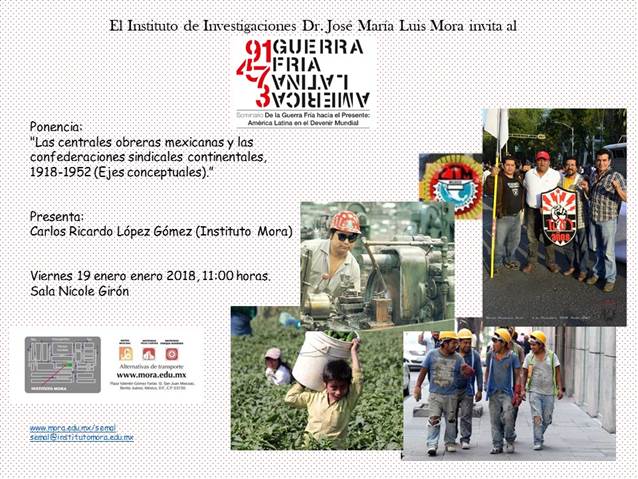De la Guerra Fría hacia el presente: América Latina en el devenir mundial
Español | English

El Seminario Interinstitucional “De la Guerra Fría hacia el presente: América Latina en el devenir mundial” tiene el objetivo de analizar y generar investigaciones en torno a la contradictoria experiencia histórica de la región, y su configuración desde el fin de la Segunda Guerra Mundial hasta las primeras décadas del siglo XXI. Está dirigido a especialistas en relaciones internacionales, latinomericanistas, al resto de la comunidad académica y al público interesado por la historia, el presente, y futuro de la región.
Los materiales a discusión serán proyectos y avances de investigación, trabajos a publicar que alimenten las reflexiones sobre la región y época de interés. Las sesiones se llevan a cabo mensualmente, y nuestra meta es la producción de artículos y libros.
Para el análisis mencionado, se propone centrar la atención en dos grandes vertientes de interpretación bajo las teorías de las relaciones internacionales: realismo y sistema mundo capitalista.
La primera apela a los deseos y ambiciones de las grandes potencias, y remite a una práctica predominante de las entidades gubernamentales donde la diplomacia, la asimetría económica y el poder político determinan las dinámicas en la región. En cambio, la segunda postula sistemas complejos en el acontecer y destino social; pone acento en la evolución de modelos conceptuales, que derivan en ideologías y prácticas que emanan de las luchas de clases.
Sitio web: http://www.mora.edu.mx/semal/SitePages/Index.aspx
» Haga clic aquí para mas información
English
The Interinstitutional Seminar “From the Cold War to the present: Latin America in the global future” has the objective of analyzing and generating research around the contradictory historical experience of the region, and its configuration from the end of the Second World War to the first decades of the 21st century. It is aimed at specialists in international relations, Latin-Americanists, the rest of the academic community and the public interested in the history, the present, and the future of the region.
The materials to be discussed will be projects and research advances, works to be published that feed reflections on the region and time of interest. The sessions are held monthly, and our goal is the production of articles and books.
For the aforementioned analysis, it is proposed to focus attention on two major areas of interpretation under the theories of international relations: realism and the capitalist world system.
The first appeals to the desires and ambitions of the great powers, and refers to a predominant practice of government entities where diplomacy, economic asymmetry and political power determine the dynamics in the region. On the other hand, the second postulates complex systems in the event and social destiny; it emphasizes the evolution of conceptual models, which derive in ideologies and practices that emanate from class struggles.
